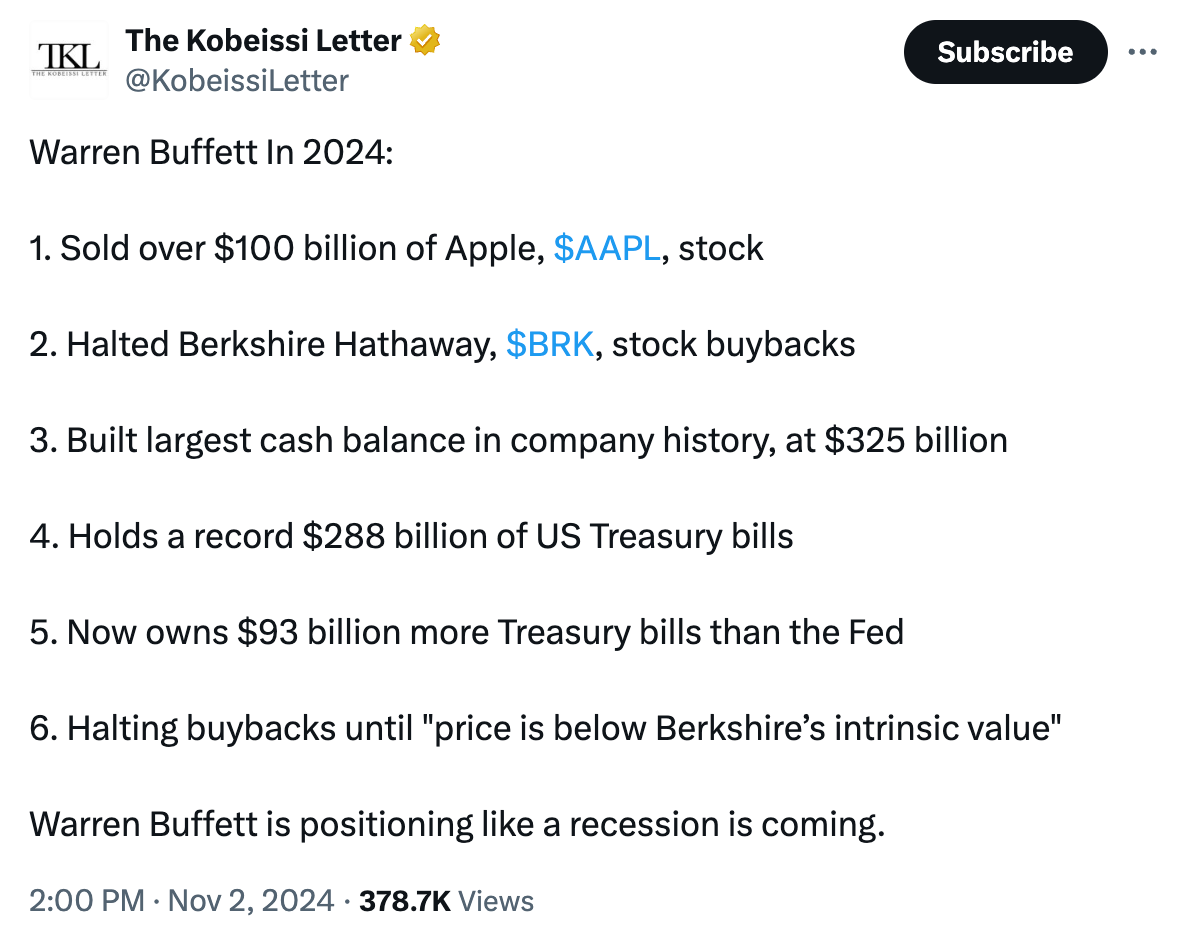What I Read This Week…
The U.S. economy added 12,000 jobs in October, Berkshire Hathaway’s cash position has reached a record high, and scientists may have discovered a new explanation for how overeating leads to diabetes
Read our Deep Dive: Understanding Federal Agencies
Caught My Eye…
The U.S. economy added just 12,000 jobs in October 2024, down from 223,000 in September 2024, marking the weakest monthly job growth in two years. What is driving this slowdown? While healthcare added 52,000 jobs and government employment increased by 40,000, these gains were largely offset by losses in the manufacturing sector, which lost 46,000 jobs. The decline in manufacturing jobs was driven primarily by the Boeing strike, where more than 44,000 machinists and aerospace workers have stopped working. Other sectors – including construction, retail, leisure and hospitality, and financial services – all recorded little to no job growth. Previous months' job numbers were also revised down: August was reduced by 159,000 to 78,000 jobs, and September was revised down from 254,000 to 223,000 jobs, resulting in 112,000 fewer jobs over the two-month period than initially reported. This slowing job growth has strengthened market expectations that the Federal Reserve will cut interest rates by a quarter point at the FOMC meeting on November 7th.
Berkshire Hathaway's cash position has reached an all-time high of $325.2 billion after selling shares in both Apple and Bank of America. What's going on? At Apple, Berkshire has reduced its stake by two-thirds over the past year, from $178 billion to $69.9 billion. At Bank of America, it has cut its stake by one-fourth since July 2024, from $45 billion to $32.6 billion. The company has been a net seller of stocks for eight consecutive quarters.
Scientists may have discovered a new explanation for how overeating leads to type II diabetes. The current scientific consensus is that obesity leads to type II diabetes because excess stored fat causes cells to become resistant to insulin. When cells fail to respond to insulin signals, blood sugar rises, forcing the pancreas to produce more insulin to compensate. Eventually, this system breaks down, leading to type II diabetes. But researchers at Rutgers may have discovered that type II diabetes develops differently than the consensus understanding. Their hypothesis is that when people overeat fatty foods, it triggers the body's stress response, causing stored fat to break down too quickly and flood the body with harmful fatty acids. This process overwhelms the body and creates metabolic stress, which leads to insulin resistance and ultimately type II diabetes. To prove their hypothesis, the researchers genetically engineered mice that lacked the enzyme needed to produce stress hormones in their body tissues. When these genetically engineered mice were fed a high-fat diet that would normally lead to obesity and insulin resistance, they did not develop insulin resistance or type II diabetes.
Other Reading…
Jeff Bezos: The Hard Truth: Americans Don’t Trust the News Media (Washington Post)
Investors ‘Fear of Missing Out’ Drives Gold Demand to Record High (Financial Times)
Amy Hood is at the Center of Microsoft’s Bet-the-Company Dive into AI (WSJ)
Biggest Digital Advertising Companies saw Significant Sales Growth Last Quarter (Axios)
Introducing ChatGPT Search (OpenAI)
U.S. Regulators Block AWS Nuclear Power Deal (The Information)
US Space Force Warns of ‘Mind-Boggling’ Build-Up of Chinese Capabilities (Financial Times)
On X…




Seems to me the T2D study is a diversion from the actual circumstances that exist. It’s not over nutrition or fat in foods that are causing the T2D epidemic. Rather it’s the over eating of Carbs, sugar, and ultra processed foods, which are nutritionally low, that are causing T2D. You guys should have Dr. Jason Fung on the All-In podcast for a quick primer on T2D and cancer causes.
Seems weird people aren't taking Buffet's "incoming recession" positioning more seriously